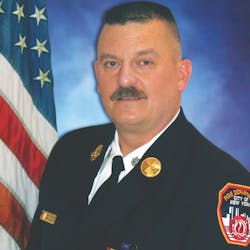RISK: exposure to the chance of injury or loss. COURAGE: the quality of mind or spirit that enables a person to face difficulty, danger, pain, etc.
There always is a lot of debate in the fire service about risk. What exactly is risk? How does it affect the work that firefighters do? If you look up the word risk in the dictionary, you’ll find what’s noted above—exposure to the chance of injury or loss. That fits perfectly into the duties of the firefighter. There is risk in everything that we do.
From the moment that an alarm is received, the responding firefighters are at risk. The proof is in the number of firefighters who are injured and killed responding to alarms.
Then, of course, we arrive on scene and are faced with another set of risks. This can include the risk of being hit by a vehicle while working on a highway incident. It could be the risk of being lost inside of a burning building or of running out of air in an immediately dangerous to life and health (IDLH) environment. It could be falling through a roof or riding down one that collapses from beneath us.
The number of situations and conditions that we face at the numerous situations and incidents that we handle can’t even be counted reliably. Risk is an ever present companion for the American firefighter.
Training
So, how do we manage risk? All of us certainly are familiar with the risk vs. reward decision-making process that was developed to help us to do just that—make decisions when we are facing risk. The phrase that speaks to the process is, “We risk a lot to save a lot, we risk a little to save a little and we risk nothing to save what is already lost.” Sounds rather simple, doesn’t it? Well, it is simple, but several variables can make it almost impossible to comply.
The first is training. Firefighters who are well trained and learn their trade are far more able to manage risk and operate safely than firefighters who aren’t as well trained. There’s no doubt about it. Well-trained firefighters not only recognize risk better but also manage risk well. Firefighters who, for example, study roof construction, fire travel, ventilation practices and roof-cutting operations are able to work longer on the roof of a burning building than those who don’t. Those same well-trained members might also evacuate a roof sooner than the less-trained members because of the knowledge that they gained and refined through their studies.
Experience
The next variable is experience. There’s no better way to learn how to do something than to do it, and after learning, doing it again and again to become exceptional. Experience greatly enhances the technical knowledge that firefighters possess and makes them even more able to manage, and even evade, risk. The risk is always there, but well-trained and experienced firefighters manage and evade it and arrive safely back at the firehouse.
Courage
What other factor can affect the degree of risk that firefighters might be able to face without negative consequences? We use the term a lot, and it truly exists: courage. If you ever were present at or witnessed a courageous act at an operation, you know what I mean. The interesting thing about courage: Like training and experience, every firefighter possesses a different level of it. I witnessed firefighters perform extraordinary acts of courage to rescue a trapped civilian and a distressed firefighter that I might not consider doing myself ever. Like training and experience, every firefighter possesses a distinctly different level of courage based on numerous factors. Some firefighters are broken in by senior firefighters who train them to accept and face higher levels of risk than others in another company. That combined with a high level of technical training and years of experience performing those tasks can create firefighters who appear to act with disregard for the risk that they face rather than simply manage it in a more commanding manner.
It isn’t universal
How each of us manages risk is quite specific and personal and unique from every other firefighter and officer who is on the fireground. Something to think about.
John J. Salka Jr. will present “Five Alarm Leadership” at Firehouse Expo. To register, visit firehouseexpo.com.






